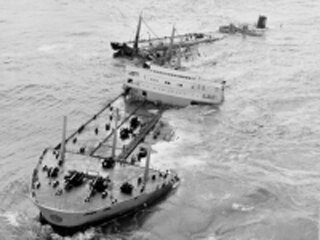TORREY CANYON, United Kingdom, 1967
18 March 1970

Incident
TORREY CANYON ran aground on Pollard Rock on the Seven Stones Reef, near Lands End, Cornwall on 18th March 1967. Thousands of tonnes of oil were soon spilling from the stricken vessel's ruptured tanks and during the next 12 days the entire cargo of approximately 119,000 tonnes of Kuwait crude oil was lost. The TORREY CANYON was the first major tanker disaster to be brought to the notice of the general public due to enormous media coverage, and drew universal attention to the dangers of first-generation dispersants.
Response
A wide variety of methods to mitigate the spill were tried. Burning the slick proved unsuccessful, and eventually the British Government gave orders for TORREY CANYON to be destroyed by aerial bombardment in the hope that all the oil still remaining on board would be burnt off. This operation was partially successful, but did not prevent escaping oil from polluting many parts of the south west of England, causing the deaths of thousands of seabirds and threatening the livelihoods of many local people in the forthcoming summer tourist season. Later the drifting oil polluted beaches and harbours in the Channel Islands and Brittany.
A distinguishing feature of the TORREY CANYON response operation was the excessive and indiscriminate use of early dispersants and solvent based cleaning agents, which caused considerable environmental damage. The dispersants were generally successful at their task of reducing the amount of oil arriving ashore and subsequently expediting onshore clean-up operations, but they were considerably more toxic than those used today and were applied in far greater concentrations, often being poured undiluted on slicks and beaches. Many of the detrimental impacts of the spill were later related to the high volume, high concentration and high toxicity of the dispersant and detergents used.
ITOPF Involvement
ITOPF was established in 1968 in the wake of the TORREY CANYON oil spill. The spill also triggered the formation of the International Oil Pollution Compensation Funds (IOPC Funds), as a clear absence of international agreements on liability and compensation in the event of such a spill was recognised. The TORREY CANYON incident was a pivotal learning curve for all those involved.
Selected Bibliography
- Zuckerman, S. (1967). The Torrey Canyon. Report of the Committee of Scientists on the Scientific and Technological Aspects of the Torrey Canyon Disaster. Departments of State and Official Bodies. Cabinet Office, London, UK
- Petrow, R. (1968). The black tide: in the wake of Torrey Canyon. Hodder & Stoughton, London, UK
- Southward, E.C.& Southward, A.J. (1978). Recolonization of rocky shores in Cornwall after the use of toxic dispersants to clean up the Torrey Canyon spill. Journal of the Fisheries Research Board of Canada 35 (5) 682-706
Links
Categories: United Kingdom, Oil, Oil Tanker, Europe, Environmental effects
